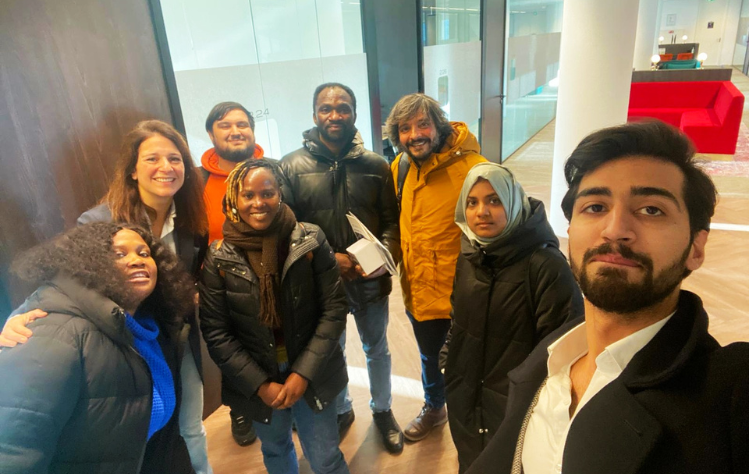Webster Leiden International Relations Students Visit European Investment Bank
February 10, 2025

A group of graduate students from Webster Leiden Campus’ International Relations program recently visited the European Investment Bank (EIB) in Amsterdam.
Organized by Professor Ernani Contipelli, this study trip was included as part of the “Politics of Development” course, providing students with hands-on experience. Students had the opportunity to explore and learn about how one of Europe’s major financial institutions functions, contributing significantly to sustainable development and economic stability. This visit served as more than just a tour; it was a chance to connect theoretical knowledge from the classroom with real-world application, revealing the pivotal role the EIB plays in shaping Europe’s future.
A Warm Welcome
During the visit, students engaged in a workshop conducted by Chantal Schrijver, Head of EIB Group Office in the Netherlands. She began her presentation with an overview of the EIB, covering different facets of the bank’s operations and investments while emphasizing its role as the lending arm of the European Union. Furthermore, she discussed how the bank fosters investment across Europe by funding innovative projects in areas like green energy, infrastructure, transportation, health care, water and the growth of small businesses.
She also explored the bank’s distinctive role as a financial and political entity. Focusing on tackling global challenges, the EIB invests in projects that align with EU priorities, such as fighting climate change and advancing digital transformation. EIB’s commitment to sustainable development and economic value paralleled that of topics discussed in the students’ coursework.
One student, reflecting on the presentation, noted, “It was eye-opening to see how the EIB acts as a catalyst for positive change, combining finance with sustainability. It really broadened our perspective on what development banking entails.”
Key Highlights
A highlight of the trip was Schrijver’s insightful overview of the EIB’s funding mechanisms and decision-making process. She detailed how the bank evaluates projects based on their feasibility, impact and compatibility with overarching European Union objectives. This exposed students to real-world approaches in practical international relations and policy implementation.
Another key point was the EIB’s engagement with climate change. In her presentation, Schrijver shared statistics regarding the institution’s investments, highlighting that 50% of their financing projects promote environmental sustainability. This sparked inquiries from students regarding the balance between profitability and social responsibility.
“Chantal’s candidness and open-mindedness during the Q&A made the session feel personal and interactive,” shared one of the students. “She wasn’t just presenting data; she was giving us a roadmap for how institutions can actively combat global challenges.”
A Thought-Provoking Q&A Session
The session ended with an interactive Q&A, where students asked insightful questions. The discussion covered the EIB’s strategy for risk management in emerging markets, its stance on funding projects in developing countries, and the monitoring and evaluation methods the bank uses for initiatives in these countries.
Schrijver’s answers offered a nuanced viewpoint, harmonizing optimism with the practical challenges of global finance. She also acknowledged that one of the bank’s challenges is navigating geopolitical tensions and ensuring equity in investment. Her insights underscored the complexity of operating in a landscape where financial decisions have profound social and political implications.
Reflections on the Experience
For students, this visit was a reminder of how interconnected global systems are and the need for multidisciplinary approaches to tackle international challenges. It highlighted the vital role institutions such as the EIB play in driving progress and aligning public policy with financial strategy. As Contipelli noted during the course program, today’s “wicked problems demand innovative solutions and steadfast collaboration.”
The study trip to EIB demonstrated the strength of experiential learning, showing that grasping the world's complexities often starts with direct engagement.
